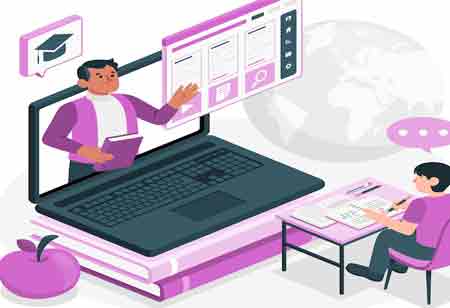THANK YOU FOR SUBSCRIBING
Be first to read the latest tech news, Industry Leader's Insights, and CIO interviews of medium and large enterprises exclusively from Education Technology Insights
Overcoming the Challenges in Online Learning
Online learning provides unique hurdles for students, but these obstacles may be overcome with the correct tactics and support. By addressing feelings of isolation, cultivating motivation, providing access to necessary technology

By
Education Technology Insights | Wednesday, December 11, 2024
Stay ahead of the industry with exclusive feature stories on the top companies, expert insights and the latest news delivered straight to your inbox. Subscribe today.
Online learning provides unique hurdles for students, but these obstacles may be overcome with the correct tactics and support. By addressing feelings of isolation, cultivating motivation, providing access to necessary technology, minimizing technical issues, reducing distractions, boosting time management, and facilitating inclusivity for students with disabilities, online learning can be a fulfilling and successful experience for all.
Fremont, CA: The COVID-19 epidemic has caused enormous changes in the educational sector, with online learning becoming the new standard. While it provides advantages such as cheaper costs and greater flexibility, it creates new student obstacles. This article delves into the most significant online learning problems and offers practical methods for students to overcome them.
Technical Equipment
Having access to the proper technological equipment is critical for successful online education. Students must have devices with a robust internet connection to attend online classes, complete assignments, and engage in discussions. However, not all kids can afford these devices, particularly those from low-income families.
Several schools give devices to pupils who cannot buy them to address the issue of a lack of technical equipment. Students might investigate if their institution offers similar programs and take advantage of the opportunity. Students can also use resources accessible in public libraries, which provide computers for instructional purposes. Borrowing devices from relatives or friends might also be an interim solution until kids can purchase their own.
Distractions
While the internet can be a useful learning tool, it can also be a source of distraction. Students may find it difficult to concentrate on their studies when they are continually assaulted with messages from social media platforms, emails, and other internet sources. These distractions might lead to procrastination and poor academic performance.
Students should use social media blockers or turn off notifications while studying to prevent internet distractions. Communicating with family and close friends about their study plans can help establish a supportive environment with fewer distractions. Finding a quiet and dedicated study area, free of distractions, can help improve attention and productivity.
Teachers can help reduce distractions by implementing dynamic learning design into their online courses. Engaging students in interactive games, surveys, and debates helps keep them focused and reduces the temptation to explore social media or other websites in class. Additionally, arranging tests and quizzes that demand spoken responses can encourage active participation while reducing distractions.
Time Management
Online learning necessitates strong time management skills to reconcile academic obligations with other commitments. Students may struggle to manage their daily routines while balancing coursework, work, and personal activities. Students who lack basic time management skills may struggle to meet deadlines while maintaining a healthy work-life balance.
Students can improve their time management by practicing multitasking and prioritizing work based on urgency and importance. Creating daily to-do lists and allotting specific time windows for each job can help students stay organized and accountable. Concentrating on one activity at a time and checking off completed activities can give pupils a sense of success and increase productivity.
Teachers can also help students manage their time correctly by conducting regular surveys to learn how they organize their time. By spotting any potential challenges or bottlenecks in their schedules, teachers can provide tailored guidance and assistance to pupils. Setting clear expectations and assignment deadlines might help students arrange their time more effectively.







